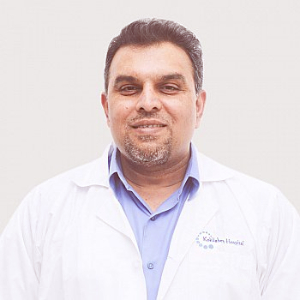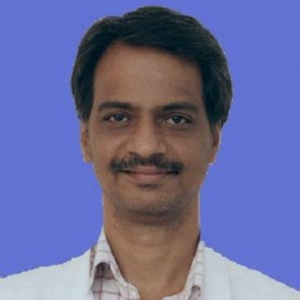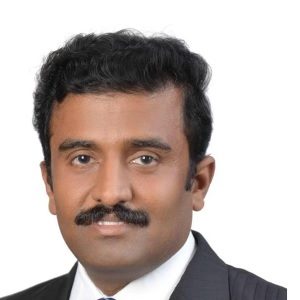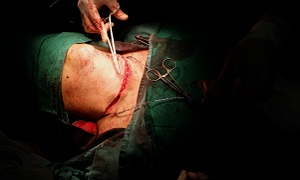Best Thyroidectomy Doctors in india
- ENT, Head & Neck Onco Surgeon; Mumbai, India
- Over 30 years’ experience
Profile Highlights:
- Dr. Sanjiv Badhwar is a well-known Head and Neck Onco surgeon in Mumbai.
- He specializes in head and neck surgery for cancer patients, cochlear implant surgery, robotic surgery to remove cancer of the head and neck region, voice disorder surgery, and other types of ENT surgeries.
- He holds an experience of over 30 years as an ENT specialist and has received advanced training from the Voice Institute in Portland, USA
- Surgical Oncologist, Hyderabad, India
- Over 20 years’ experience
Profile Highlights:
- Dr. Sharan Kumar Shetty is a renowned Head and Neck Surgical Oncologist in Hyderabad currently associated with CARE Hospitals.
- He has experience of over 20 years in the field and is an expert in the treatment of cancers affecting the head and neck regions such as the oral cavity, larynx, pharynx, trachea, sinus, salivary gland, nose, and throat.
- Dr. Sharan Kumar Shetty’s expertise also lies in reconstructive cancer surgeries using free flap and pedicled flaps.
- Surgical Oncologist, Gurugram, India
- Over 10 years’ experience
Profile Highlights:
- Dr. Shilpi Sharma is a highly experienced surgeon and oncologist who has previously worked in prestigious institutions such as Tata Memorial Hospital, and National Cancer Institute.
- Throughout her career, she has conducted various high-quality research in the field of head and neck cancers. Dr. Shilpi Sharma has also been part of various randomized and nonrandomized trials and has also been involved in clinical and translational research.
- She is also a member of ICMR guideline committee which formulated the ICMR guidelines on tongue cancers.
- Surgical Oncologist, Head & Neck Surgical Oncologist; Chennai, India
- Over 18 years’ experience
Profile Highlights:
- Dr. Kannan S is a prominent Otorhinolaryngologist in India with nearly 18 years of experience.
- He holds a position as a Consultant Head and Neck Oncosurgeon in Apollo Cancer Institutes, Chennai.
- Being an MS and MBBS in Surgical Oncology, his interests led him to treat many ENT problems.
- He published several papers related to the same. He regularly attends conferences in his field and has also been awarded for his work.
Best Thyroidectomy Hospitals in India
CK Birla Hospital, Gurugram
- City: Gurugram, India
Hospital Highlights:
- The CK Birla Hospital in Gurugram is a NABH-accredited multi-specialty hospital.
- The hospital strives to increase the quality of healthcare by focusing on UK NHS nurse and midwife training requirements. Policies and practices derived from the National Institute for Health and Treatment Excellence (NICE) recommendations in the United Kingdom ensuring that a strong focus on safety, high-quality clinical care, and sanitation is maintained.
- The hospital’s cutting-edge technology and facilities allow for real-time communication and seamless collaboration among caregivers, ensuring accuracy and the best possible results. Those with foreign experience and accreditations make up part of the hospital’s team of clinicians.
KIMS Hospital, Hyderabad
- City: Hyderabad, India
Hospital Highlights:
- KIMS Hospital (a brand name of Krishna Institute of Medical Sciences) is one of the largest and best multi-speciality hospitals in Hyderabad. The hospital provides various treatments to an enormous number of patients.
- The hospital has a capacity of more than 3000 beds. KIMS Hospitals offers different healthcare services in more than 25 specialities and super specialities.
- The hospital is equipped with modern medical equipment and technology. It has robotic equipment to provide minimal invasive techniques for patients.
- The hospital is aimed at providing world-class healthcare facilities and services at an affordable cost for patients.
- The various specialities and departments of the hospital include neurosciences, gastroenterology & hepatology, robotic science, reproductive sciences, dental science, oncological sciences, organ transplantation, heart and lung transplantation and mother and child care.
Fortis Hospital, Shalimar Bagh
- City: New Delhi, India
Hospital Highlights:
- Fortis Hospital in Shalimar Bagh is a multi-super specialty hospital that strives to provide world-class patient care by leaving no stone unturned.
- Fortis, Shalimar Bagh, with 262 beds and a 7.34-acre footprint, provides the best level of medical care through its team of doctors, nurses, technicians, and management professionals.
Reliance Hospital, Mumbai
- City: Mumbai, India
Hospital Highlights:
- Reliance Hospital is one of the best super-specialty care hospitals in Navi Mumbai.
- The main purpose of this hospital is to become a trustworthy place for the best health and hope for society. The hospital is well connected to the suburbs of Mumbai and Navi Mumbai.
- The hospital has various specialty departments, viz., Accident & Emergency, Anesthesiology, Dental Services, Dermatology, Diabetology, Dietetics Nutrition, Endocrinology, ENT, Gastroenterology, General Surgery, Gynaecology And Obstetrics, Hepato Pancreato Biliary Surgery, Infectious Disease, Internal Medicine, Interventional Radiology, Laboratory Medicine, Minimal Access Laparoscopic Surgery, Nephrology, Neurosciences, Opthalmology, Orthopaedics, Paediatrics, Pain Management Palliative Care, Physical Medicine Rehabilitation, Plastic And Reconstructive Surgery, Psychiatry, Pulmonary Medicine, Radiology, Rheumatology, Transplant, Urology Andrology, Vascular Surgery
Lilavati Hospital & Research Centre, Mumbai
- City: Mumbai, India
Hospital Highlights:
- Lilavati Hospital & Research Centre is India’s premier multi-speciality tertiary care hospital and has been recognised as a global medical excellence centre.
- Lilavati Hospital & Research Centre has built an unrivalled level of trust with its patients over the years, thanks to a solid foundation that comprises cutting-edge facilities, the best medical competence, research, education, and charity endeavours.
- The hospital is quite proud of the fact that it now serves patients from all kinds of backgrounds, not just from the United States but from all around the world.
- The hospital has a total of 323 beds, one of the largest Intensive Care Units (ICUs), 12 Operation Theatres with modern amenities, over 300 consultants, and almost 1,800 personnel.
Thyroidectomy
Thyroidectomy is a procedure which involves the removal of all or part of the thyroid gland. Located at the base of the neck, the thyroid is a butterfly-shaped gland, which produces hormones for regulating every aspect of one’s metabolism, starting from a person’s heart rate to how quickly they burn calories.
Thyroidectomy is used for treating thyroid disorders, which can include cancer, a noncancerous enlargement of the thyroid or an overactive thyroid. Depending on the reason for your surgery, your doctors will determine how much of your thyroid gland they will be removing. If they remove only a portion, then your thyroid might be able to function normally after surgery. However, if the entire thyroid needs to be removed, you will require daily treatment with thyroid hormone in order to replace your thyroid’s natural function.
Purpose
The presence of nodules or tumors on the thyroid gland is usually the common reason for thyroid surgery. Although most of the nodules are benign, some of them can be cancerous or precancerous.
Benign nodules can lead to problems, if they are large enough to obstruct the throat or if they stimulate the thyroid and overproduce hormones.
If the thyroid gland starts swelling or gets enlarged, it can be another reason for thyroid surgery, as such a condition can block one’s throat as well as interfere with eating, speaking and breathing.
Preparation
If you are suffering from hyperthyroidism, your doctor might prescribe you medication to regulate the thyroid function as well as to decrease any risk of bleeding.
You might also need to avoid eating and drinking for a certain period before the surgery. This will help in avoiding anesthesia complications. It is also better if a friend or relative is available to help you reach home after the procedure.
This procedure is generally performed under general anesthesia, so you will not be conscious during the entire time. First, the anesthesiologist will be giving you an anesthetic medication as a gas to breathe through a mask, or he/she will inject a liquid medication into a vein. Next, a breathing tube will be placed in your trachea, so that you are able to breathe properly throughout the procedure.
Several monitors will be placed by the surgical team on your body to make sure that your heart rate, blood pressure as well as your blood oxygen all remains at safe levels throughout the procedure. The monitors will be including a blood pressure cuff on your arm and heart-monitor leads which will be attached to your chest.
Procedure
Once you are unconscious, the surgeon will be making an incision low in the center of your neck. It might be placed in a skin crease, where it will be difficult to see once the incision is healed. After this, all or part of the thyroid gland is removed, depending on the reason for the surgery.
If you are having a thyroidectomy due to thyroid cancer, the surgeon might also examine as well as remove lymph nodes around your thyroid. Thyroidectomy generally takes between one to two hours. The time depends on the extent of your surgery.
There are multiple approaches to thyroidectomy, which includes:
Conventional thyroidectomy
In Conventional thyroidectomy, an incision is made in the center of your neck to access your thyroid gland directly. Most people are likely to be operated on using this procedure.
Transoral thyroidectomy
Transoral thyroidectomy approach uses an incision inside the mouth, to avoid making one in the neck.
Endoscopic thyroidectomy
In Endoscopic thyroidectomy, smaller incisions are used in the neck. Surgical instruments as well as a small video camera are inserted through the incision. Throughout the procedure, the camera will guide your surgeon.
After the surgery
You will either need to stay overnight at the hospital or go home the same day. You might experience some pain in the neck area, but medicine will help. You might also have a hoarse voice or sore throat for some days. There might be a drain as well from the site of the incision. It can help with healing and later it can be removed.
You will receive instructions regarding taking care of yourself after the operation and when to see your doctor for follow-up. If you require other cancer treatments, they can begin soon after the operation.
If all of your thyroid glands are removed, your doctor might be prescribing thyroid hormone replacement medicine for replacing the thyroid hormones. You might need this medication for the rest of your life and the doctor will need to make a few changes along the way to make sure you get the right amount. However, if only part of your thyroid was removed, you may not require any kind of thyroid hormone replacement medicine.
Once you reach home home, you will be able to return to your usual routine. However, you should wait for a minimum of ten days before you do any vigorous activity. It can take up to a year for the scar from the surgery to fade. Your doctor might recommend you sunscreen as it can help minimize the scar from being noticeable.
Risks
Like all major surgeries, thyroid surgery has the risk of an adverse reaction to general anesthetic. Heavy bleeding and infection are also possibilities in some cases.
However, risks that are specific to thyroid surgery occur quite rarely. The two most common risks are:
- Damage to the nerves connected to your vocal cords
- Damage to the parathyroid glands, i.e. the glands controlling the level of calcium in your body
Supplements can be used for treating low levels of calcium. It is important for the treatment to begin as soon as possible. If you feel nervous or jittery or if your muscles start twitching, you need to inform your doctor immediately, as these are signs of low calcium.
It is also notable that out of all patients having a thyroidectomy, only very few will develop hypocalcemia. Out of those, approximately 75 percent will recover within a year.










